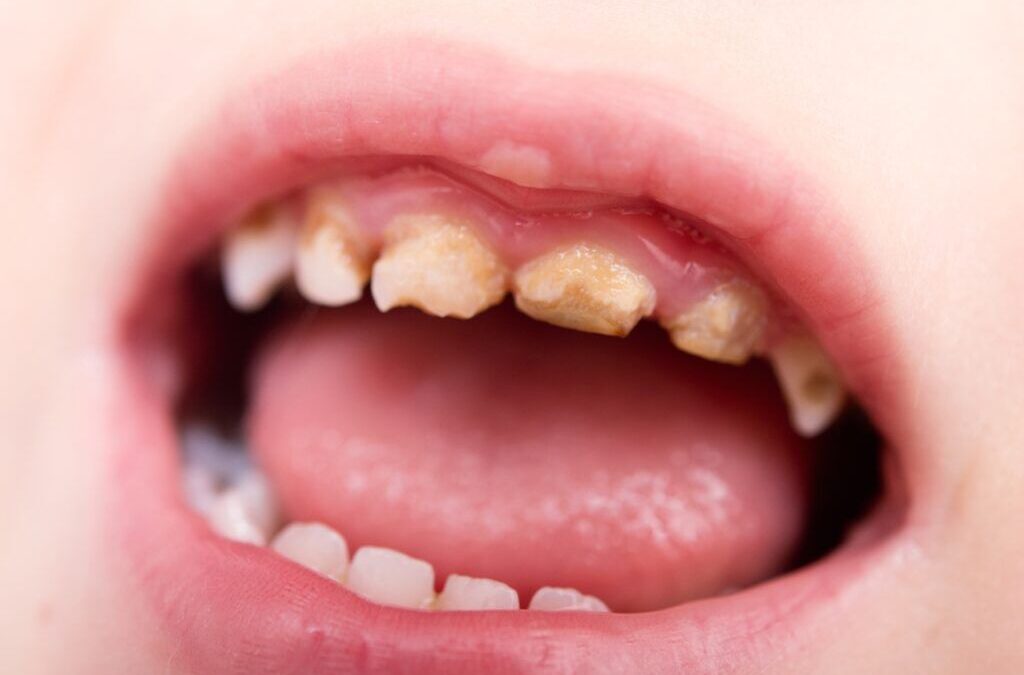Tooth decay in infants and young children, often referred to as Baby Bottle Syndrome or Early Childhood Caries (ECC), is a prevalent yet preventable condition. It occurs when a baby’s teeth are frequently exposed to sugary liquids, such as milk, formula, fruit juice, or sweetened water, for extended periods.
Understanding the causes, effects, and preventive measures of Baby Bottle Syndrome is crucial for parents and caregivers to safeguard their child’s oral health.
Causes of Baby Bottle Syndrome:
Baby Bottle Syndrome primarily stems from prolonged exposure to sugary liquids, typically through bottle feeding. Factors contributing to its development include:
Frequent and prolonged bottle feeding, especially during naptime or bedtime.
Putting a baby to bed with a bottle containing sugary liquids.
Continuous use of a bottle or sippy cup as a pacifier.
Poor oral hygiene practices, such as infrequent tooth brushing or not wiping the gums after feeding.
Effects of Baby Bottle Syndrome:
The consequences of Baby Bottle Syndrome extend beyond dental health and can impact a child’s overall well-being:
Tooth decay: Sugary liquids coat the teeth, providing fuel for bacteria that produce acids, leading to enamel erosion and cavity formation.
Pain and discomfort: Tooth decay can cause pain, sensitivity, and difficulty eating, impacting a child’s nutrition and growth.
Infection and abscesses: Untreated cavities can progress, leading to dental infections and potentially serious complications.
Impact on permanent teeth: Early loss of primary teeth due to decay can affect the alignment and health of permanent teeth.
Preventive Measures for Baby Bottle Syndrome:
Preventing Baby Bottle Syndrome involves adopting healthy oral hygiene practices and making informed choices about feeding habits:
Limit sugary liquids: Avoid giving infants sugary drinks like fruit juice or sweetened water. Opt for breast milk or formula instead.
Practice proper bottle feeding techniques: Hold the baby while bottle-feeding to monitor intake and avoid prolonged or nighttime feeding sessions.
Clean the gums: After each feeding, gently wipe the baby’s gums with a clean, damp cloth to remove residue and bacteria.
Introduce cups early: Transition from bottle to cup around 6 months of age to discourage prolonged bottle use.
Encourage water consumption: Offer water between meals and snacks to rinse the mouth and hydrate the child.
Schedule regular dental visits: Start dental check-ups by the child’s first birthday or within six months of the eruption of the first tooth.
Treatment Options for Baby Bottle Syndrome:
If tooth decay has already developed, prompt intervention is necessary to prevent further damage. Treatment options may include:
Dental fillings: Repair cavities with tooth-colored fillings to restore the tooth’s structure and function.
Dental crowns: Cover extensively decayed or damaged teeth with crowns to protect them from further deterioration.
Pulp therapy: Treat infected tooth pulp (nerve tissue) with procedures like pulpotomy or pulpectomy to save the tooth.
Tooth extraction: Remove severely decayed or infected teeth to prevent the spread of infection and preserve oral health.
Baby Bottle Syndrome is a preventable condition that can have lasting consequences on a child’s oral health if left untreated. By understanding the causes, effects, and preventive measures, parents and caregivers can take proactive steps to safeguard their child’s teeth and promote healthy oral habits from an early age.
Regular dental check-ups and timely intervention are essential for maintaining a bright and healthy smile throughout childhood and beyond.
